A day at the Spur Equine Program
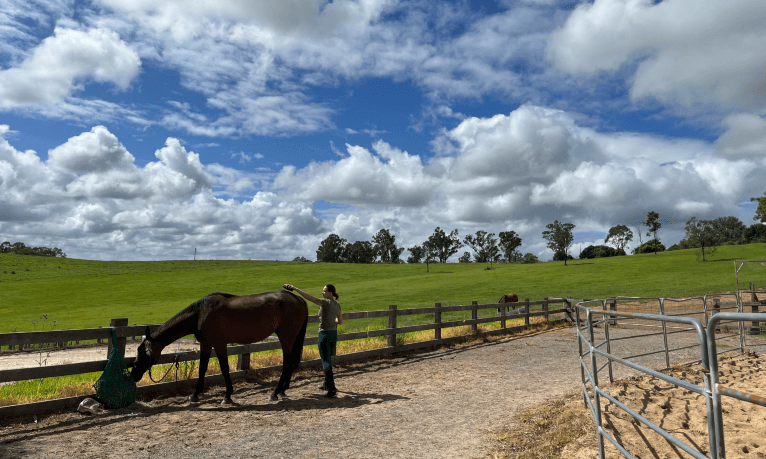
How equine wellbeing helps to improve the wellbeing of veterans at the Spur Equine Program, and the volunteers who make it all possible.
At a glance:
- The Spur Equine Program aims to promote veterans’ wellbeing through a unique equine wellbeing program.
- Program Manager Max Streeter worked with RSL LifeCare Veteran Services to build the program into a successful year-round venture.
- Spur Ranch is almost entirely staffed by volunteers, who work daily to maintain the horses and train participants.
- The program culminates in a challenging yet rewarding five-day trek through the Snowy Mountains.
An hour southwest of Sydney is Spur Ranch, co-located at RSL LifeCare’s John Goodlet Manor in Picton. Here, a group of volunteers coordinates the Spur Equine Program, a unique offering designed to improve veterans’ wellbeing.
Designed by veterans for veterans, the program also encourages participants to have fun and challenge themselves. This year, RSL sub-Branches donated $3.3 million to RSL LifeCare to ensure programs like this continue to be delivered to veterans and their families.
The man at the reins of Spur Ranch is Max Streeter, a veteran passionate about the benefits of equine wellbeing.
“About eight years ago, I was still coming out of my shell after leaving the service,” he says. “While looking for ways to assist my recovery, I came across a two-day horse course. It was the most amazing thing I’ve ever done.
“I got to connect with horses and learn the basics about training. But the courses were being run on an ad-hoc basis, and when I joined I thought there should be a follow-up.”

Spur Ranch is situated about an hour southwest of Sydney, near the town of Picton.
Identifying a need for veterans’ access to equine wellbeing, Max worked with RSL LifeCare Veteran Services to build the program into what it is today.
“The program has really come together over the past two years,” he says. “There is a series of bolt-on courses. It’s easily accessible and designed to help veterans complete the program – not so onerous that someone would not achieve its outcomes. The last thing a veteran wants to do when not in the best state of mind is to approach something that’s unachievable.”
Max now believes the Spur Equine Program is the best of its kind in Australia.
“We now have a program which we should be very proud of as an organisation,” he says.
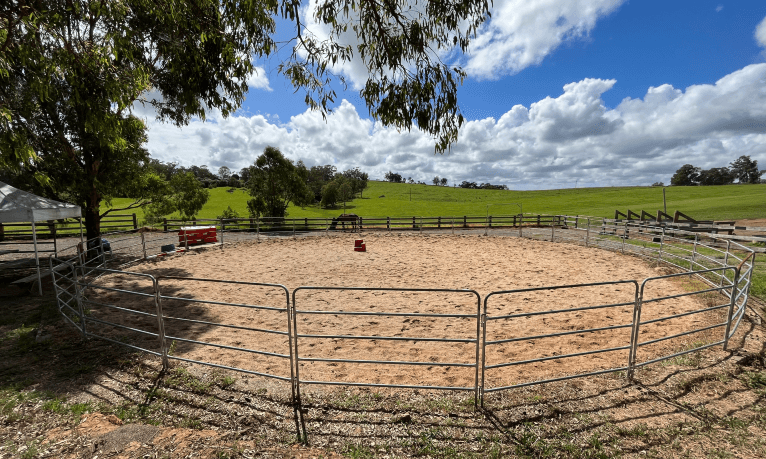
Volunteers work five hours every day to maintain the horses.
A day at Spur Ranch starts early. Volunteer wranglers are out and about in the early morning, working and feeding the horses, and generally keeping them fit and ready.
“We run courses twice a month,” says Max. “We have so many people waiting to join our program, and we’ve doubled the offerings for this year, so there’s a lot of work for us. My crew is out on horses by 7am, working through six horses by 10:30 or 11:00.”
Almost all of his staff are volunteers, apart from lead ranch hand Karen Monds and wrangler Rebecca Kennedy.
“Our staff are part-time, but often contribute more hours to the ranch,” remarks Max.
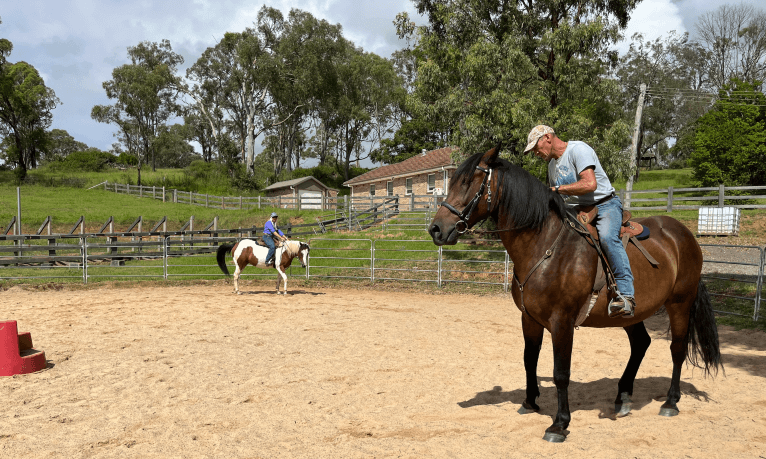
There are 14 horses trained at Spur Ranch.
Onsite accommodation for 10 people – in renovated huts that were originally built to house isolating tuberculosis patients and veterans repatriating after World War II – offers participants a place to sleep and rest while on the program.
Beyond the therapeutic benefits of riding and caring for horses, the program’s outcomes include multi-day riding tours through the bush.
An initial two-day horse handler’s course introduces participants to the basics of horse welfare, as well as their nutrition and health needs.
A four-day riding course introduces the basics of riding and is followed by a week-long riding intensive on the RSL LifeCare property, using trails that simulate trek riding conditions.
The program culminates with a seven-day trek through the Snowy Mountains, an adventure that occurs twice a year.
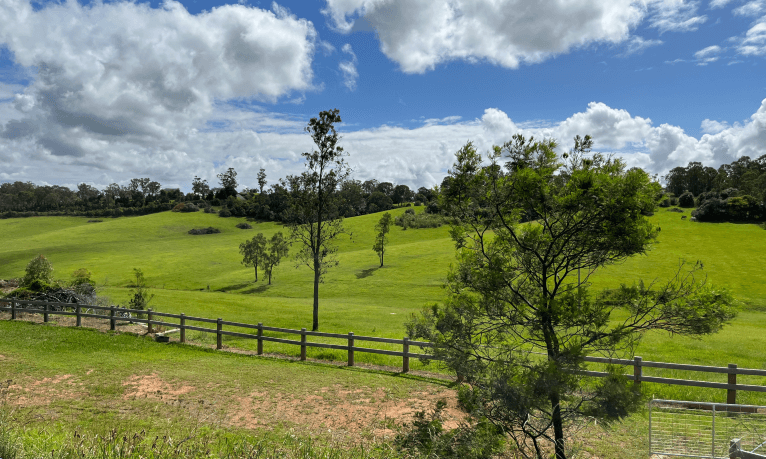
The horses roam nearby grassy fields when not being trained.
Army veteran Rebecca Kennedy, who is now employed by RSL LifeCare was one of the program’s regular volunteers and grew up with horses.
“I got rid of my last horse when I joined Defence in 2011,” she recalls. “I spent about a decade thinking I would never have anything to do with horses again.
“Then I came across the Spur Equine Program via my case manager at the National Centre for Veterans’ Healthcare at Concord Hospital, and started volunteering once a week. After I did the trek through the Snowy Mountains, Max offered for me to come out here everyday to help train and ride the horses.
“We have people here who have never jumped on a horse in their life, so we need it to be suitable for beginners. Some horses, such as Django, come from a racing background. And then we have about five or six that haven’t been trained to sit under a saddle with someone on their back. So we have to completely re-educate the horses to do what we want them to.”
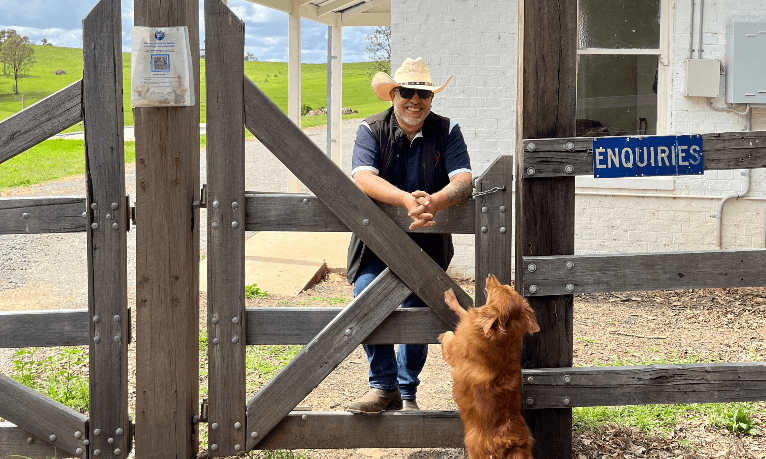
Spur Program Manager Max Streeter is assisted by his faithful companion Teddy.
The program, its volunteers and its horses have outlasted bushfires, heavy rain and COVID. Despite these challenges, the program is progressing in leaps and bounds, with 10 participants in its first year the program is hoping to support over 100 veterans in the coming 12 months – and Max is quick to provide credit where credit is due.
“You really can’t isolate the success of what we do here from the wider RSL LifeCare Veteran Services team,” he says.






